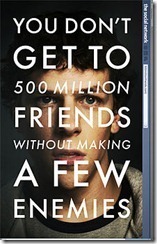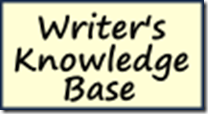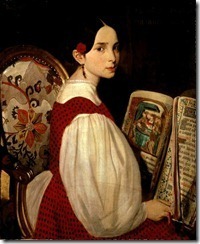Elizabeth Spann Craig's Blog, page 214
February 16, 2011
Building Our Protagonist
 It seems like I've unintentionally set up this past week as Protagonist Week. :) Can you tell I've been working on a new protagonist for the new series?
It seems like I've unintentionally set up this past week as Protagonist Week. :) Can you tell I've been working on a new protagonist for the new series?
I'm also reading, at the same time, Stephen King's excellent book, On Writing. I was startled to read, though, that he never felt any real sense of liking for Carrie White, the protagonist in his first novel, Carrie. He says:
Carrie White seemed thick and passive, a ready-made victim.
I've written protagonists that can be difficult (my Myrtle Clover character comes to mind.) But I've always liked them. They're always people that I would want to spend time with. I think it would be tough to write a book when you're not wild about the protagonist. In fact, it was apparently tough for King, too—he ended up throwing an early draft of the manuscript into the trash, until his wife fished it out.
For me to be able to work with a protagonist over the course of a series, there are definitely some traits I'd like them to have:
Humor: When someone lacks a sense of humor, they're frequently taking themselves too seriously.
Looks and Means: Average or pleasant looking and comfortable
Flawed: I'm a fan of flaws and I've mentioned writing my own into my poor protagonist.
Proactive: They attack problems instead of watching to see if someone else will leap into action.
Intelligent or Canny: If they're not geniuses, it's okay—but I do like a clever mind or simple common sense
They know their own mind: There aren't lots of wishy-washy scenes where they wonder what they should do next.
They're dynamic: They grow over the course of the book or series.
One thing that's important to me is knowing what motivates them. I want to have some sort of idea of what makes the protagonist tick. Otherwise, I won't really get them and know how they'll react in different situations.
If you're in the protagonist building phase right now, yourself, here are some links that I've found useful in the past:
Alexandra Sokoloff: Creating character - the protagonist Adventures in Children's Publishing: Character Worksheet
Eclectics: Fiction Writer's Character Chart
The Writer's Knowledge Base (and click on 'character')
There Are No Rules: Your Protagonist Must Have a Goal
Guide to Literary Agents: Agent Donald Maass On: Your Tools for Character Building
What are traits that you find easy to work with in your protagonist? (I think many writers would be looking for different traits…and desirable traits might differ from genre to genre.)
February 15, 2011
When Protagonists are Unlikeable or Difficult
 I'd heard a lot about the movie The Social Network, and decided to rent it last weekend to see what the fuss was about.
I'd heard a lot about the movie The Social Network, and decided to rent it last weekend to see what the fuss was about.
The movie was well done, I thought. One thing that really interested me was how riveted I was by the film when I actually didn't give a flip about many of the characters in it.
Mark Zuckerberg (as portrayed in the movie) is not exactly the most likeable guy out there. Actually, he comes across as borderline sociopathic.
The Winklevoss twins who claimed Mark Zuckerberg stole their idea for Facebook? It's hard to really feel sorry for them. It sounded like their idea was for more of a Harvard dating site.
Sean Parker, the founder of Napster? Major jerk in the movie.
I honestly couldn't even summon up sympathy for Zuckerberg's ex-girlfriend. Who would go out with such a person, anyway?
The only character that I found sympathetic in the film was the former Facebook CFO, Eduardo Saverin. He was only CFO because he was Zuckerberg's roommate/friend and had money in his checking account.
I wondered why I found the movie so interesting-- usually I'm all about the characters.
The main character, Zuckerberg, is just different. He's difficult to figure out. He's brainy (usually an appealing trait…except when the braininess is used against you in a scheming way) but was written to be almost petty in his immaturity and jealousy.
So this seems to be a story where the complexity and ambiguity of the main character—and the hopes of a hint at what makes them tick—is what makes it appealing.
Have you watched the movie? What made you keep watching it? Or, if you haven't watched the film, what makes you keep reading a book when there's an unlikeable protagonist? Have you ever written one?
February 14, 2011
Character Clues
 I've never really thought about it until now, but my friends are very, very specific whenever we set times to meet.
I've never really thought about it until now, but my friends are very, very specific whenever we set times to meet.
I'll arrange to pick up a friend for lunch or to volunteer at our kids' school. "Why don't you come by at 9:35?" they'll suggest. Or, "Elizabeth, I'll be ready at 11:50."
A friend pointed this out recently, "You know no one else gets precise instructions like that." I didn't understand. She said, "No one else is told the exact minute to meet. Most people will say something on the hour or the half-hour. Maybe on the quarter hour. The only reason people tell you that is because you'll be there at exactly that time. You're never early or late. If you were late, I'd call the cops because I'd know something horrible had happened to you."
So, if I were a character (and I'm wondering now if maybe I am), a reader could possibly make some assumptions about me. Some might be right and some might be wrong.
Someone might conclude that I'm a little Type A. They might conclude that I keep an eye on the clock. Maybe they'd just conclude that I'm punctual (although apparently I take it a little too far.)
Of course I'm all about clues, since I'm a mystery writer. The fun thing about character clues is that the reader gets to figure things out for themselves. Editors love showing—and it's a great way to show.
Frequently, when I think about character clues, I'm using clues that are physical pointers. In other words, I'd have something like a character who opens his car door and a bunch of papers and wrappers fall out. Easy to make assumptions about him, right?
But if I bring in another character, I can show that character's demeanor when dealing with the protagonist—and add dialogue clues to hint at character traits and the characters' relationship with each other .
Maybe you have a character that you want to represent as someone who talks too much. This could easily be expressed by interruptions from a second character or their signs of impatience. Or of them putting off a phone call with the character. Much better than pages and pages of chatty dialogue to prove the point.
Since I'm a mystery writer, I might also be interested in planting the wrong impression of a character. I might want to mislead the reader. (Other novelists might want to do the same thing, for different reasons.) Maybe the character is unnaturally chatty because they're nervous. Maybe the second character is just an impatient person who interrupts—maybe they're not making a point about the character's loquaciousness at all.
How do you handle character clues?
February 13, 2011
Building the Writer's Knowledge Base—by Mike Fleming
 Hannibal from the A-Team always loved it when a plan came together. Unfortunately, the Writer's Knowledge Base (WKB) didn't emerge from some well thought out plan. While I'm not a believer in destiny I'll admit that sometimes it does seem like a real force and the WKB could be an example. In this post I'll describe how the WKB came to be, how it works, and why I'm doing it.
Hannibal from the A-Team always loved it when a plan came together. Unfortunately, the Writer's Knowledge Base (WKB) didn't emerge from some well thought out plan. While I'm not a believer in destiny I'll admit that sometimes it does seem like a real force and the WKB could be an example. In this post I'll describe how the WKB came to be, how it works, and why I'm doing it.
When I started following writers on Twitter I quickly realized that the excellent links they posted had the lifespan of a gnat. Actually, gnats live a lot longer. It seemed like a shame that the links had such a short shelf life. The actual page at the other end of the link was still there, of course, but finding it is a lot trickier when you don't have a human curator separating the good from the bad.
While writing this post I dug through my notes to find what I wrote about the idea I had for fixing the problem. I found a less-than-eloquent entry on September 30, 2010, that says:
"Monitor writers' tweets for links to writerly subjects especially on the craft of writing. Then, user could search for "characterization" and get links to all kinds of articles."
While those two sentences clearly foreshadow the WKB as it is today, back in September it was just another idea in a bucket full of them. While I suspected it was a good idea I decided to continue focusing on Hiveword which is the fiction organizer I'm developing. In fact, the idea itself was intended to be part of Hiveword at some point. That's the context I was in at the time.
Now keep in mind that @elizabethscraig is one of the Twitterers I was following and while she is not the only one to post links I think we can all agree that she is by far the most prolific one. So imagine my surprise when I saw her post on December 13th where she was exasperated about the difficulties of making all of those great links findable.
Well.
The problem was she had content and no technology and I had technology and no content. Isn't that how Reese's peanut butter cups were born?
This smacks of destiny, I thought. So, I slept on it and on the next day sent Elizabeth an email outlining my proposed solution. After running a background check on me she decided that together we could provide a compelling free service to writers everywhere. Bloggers would benefit, too, since they would have another source of traffic. There was little downside.
With Elizabeth on board I set off to work. From concept to implementation it took under a month to do on a part-time basis since I have a day job. Part of the reason it was so fast was that I was able to leverage the platform I already had for Hiveword. Another reason is that I had an appendectomy in early January and the doctor said I should stay home for a week. How convenient. 40+ hours of work on the WKB. w00t!
Of course, telling you how it works would spoil some of the magic, no? I think you'll find that it's actually fairly mundane. But if you insist...
The WKB automatically checks Elizabeth's Twitter feed once an hour, pulls any new tweets since the last time, and stores them in a holding area in the database. Each day I manually process each link by copying and pasting the article content into the search engine component. The search engine indexes the content and makes it fast to search. That's where all the magic is, of course.
You might be wondering why I do the manual part when I could have the computer do it. I'll tell you, that's a mighty fine question given the number of links Elizabeth tweets! The answer is simple, though, and it's about search quality. If I index the entire article the search engine component will consider the whole page including header, footer, sidebars, ads, comments, etc. That can obviously throw off the relevance score when you do a search. If bloggers would agree on a standard way of marking content I could pull it automatically but there's not enough consistency for me to do that.
Then there was the fact that Elizabeth already had approximately 5,500 links on her Twitterific pages. Those links were just sitting there daring me to get them indexed. I'm pleased to say that I corralled those rascals but I didn't process them manually, of course. Rather, the entire page of each article was indexed which, unfortunately, has the drawbacks mentioned above. That's why you'll sometimes see strange snippets under a result. Sorry about that. However, there are now more than 6,000 articles in the WKB for you to learn from and enjoy.
Finding articles is rather easy because the interface is intentionally simple a la Google. Searching is an obvious way to find articles but you can find plenty of gems by trying the Random or Popular links. Random is self-explanatory and Popular would perhaps be better named "Top 100" since that's what it's really showing. Give them a try if you haven't already; I think you'll be pleasantly surprised.
You might also be wondering why I'm doing this. There are actually a bunch of reasons. For example, as a programmer I've benefited greatly from the work of others on the Internet who gave freely of their time and skill and I've wanted to contribute something back for a while now but hadn't been able to hit on the right thing. I always assumed it would be something for programmers but giving something to the writing community is like paying it forward. That works for me.
Also, the WKB amplifies the work that Elizabeth is doing for writers so that's a win, too. As mentioned earlier bloggers will get more recognition and traffic and users of the WKB will hopefully learn something from their time spent using it. That means four distinct parties can benefit from the WKB -- how great is that?
I'm elated by the reception the WKB has gotten from the writing community and I'm pleased that so many get value from it. I enjoyed creating the WKB and of course it wouldn't be as useful as it is without Elizabeth's help. She does a huge amount of work digging up the content in the first place.
That said, the WKB is not done. Would you believe I have a bucket full of ideas for it? Stay tuned!
-----------------------
Mike Fleming is a software engineer who can't seem to get enough of his craft. Give him something to do by suggesting some features for the WKB. He also maintains the WKB's Facebook page which he considers a place for insiders to stay informed about WKB news and tips. You can also sign up for the Hiveword email list if you want to be notified when the fiction organizer is ready.
February 12, 2011
Twitterific
Here are writing links that I've posted to Twitter for the past week.
I'm delighted that now we have an efficient method of locating resources on writing topics when you need them—via the Writer's Knowledge Base search engine and software engineer and writer Mike Fleming's ingenuity. The links I tweet (which are writers' blogs, agents' and editors' blogs) all are added to the engine to make it easier for you to access the information you're looking for.
Hope you'll come back tomorrow when Mike talks a little about how he came up with the idea for the Writer's Knowledge Base and how it works.
Why Write a Novel—Your Reason is the Right One: http://dld.bz/M5wn
What Kind of Writer Are You? Career Themes: http://dld.bz/M5wh
Setting, POV, Backstory & Characterization: http://dld.bz/M5wf
Style Sheets: A Tool for You and Your Critique Partners: http://dld.bz/Mmme
If You Build it, They Will Read: Plotting With Layers: http://dld.bz/M5vU
Top 5 Things Writers Should NOT Do: http://dld.bz/M5vN
Reasons why today's crime novelists should read the classics of the genre: http://dld.bz/MxHY @mkinberg
Honing your dark hero: http://dld.bz/MmkR #amwriting
Youth *can* enjoy verbal storytelling: http://dld.bz/Mj7k and http://dld.bz/Mj7m @kevincordi
Do lit mags have the same chance for survival as popular titles? http://dld.bz/Mjz4
Expose Your Writing Sins: http://dld.bz/KVqM
Myst. Lov. Kitchen: The Food of Love: Spaghetti and Meat(less) Balls http://bit.ly/hBosGb @CleoCoyle
One author's life in writing (Guardian): http://dld.bz/MmhG
10 Tips to Ensure a Productive Writing Day: http://dld.bz/Mjy4 @elspethwrites
The Ancient Editor Goes to Lunch: http://dld.bz/Mjyz
A Feedback Format for Critiques: http://dld.bz/Mmkx
Tips for Avoiding Crime Fiction "Road Hazards": http://dld.bz/MxH4 @mkinberg
Nice wrap-up--Creativity Tweets of the Week: http://dld.bz/Mu7N
An author with a POV Q&A: http://dld.bz/MxCe @authorterryo
Dialogue Tags: How to Kill Off Some Of The Little Buggers: http://dld.bz/MxYz @SharlaWrites
The 10 Essential Grammar Rules—of Life: http://dld.bz/Mu7E
4 tips to prepare for your book launch: http://dld.bz/Mxq2 @hopeclark
An agent's post: How to Get Published (The Definitive Post): http://dld.bz/Mu77
Using Advertising Lessons to Make Your Story: http://dld.bz/MxpW @hopeclark
Need tips for plotting? http://hiveword.com/wkb/search?q=plot #amwriting
10 Ways to Promote Your Book in Your Own Backyard: http://dld.bz/Mmkp
Computers vs. longhand--and an interesting study on the pros and cons of both approaches to writing: http://dld.bz/Mu6n
Coincidences in writing: http://dld.bz/Mmjf #amwriting
Six Steps for Approaching Potential Critique Partners: http://dld.bz/MmgR
Critique Groups as an Unreliable Narrator: http://dld.bz/MjxJ #amwriting
The Most Important Thing A Writer Can Do (Other Than Read And Write): http://dld.bz/MwpS @ajackwriting
When Hiring a Publicist Make a Real Connection: http://dld.bz/MjtG
10 great places freelance writers can find story ideas: http://dld.bz/Mjtk
How to Be a More Effective Author Online: http://dld.bz/MbU9
SFF and the Classical Past, Part 4—Legions of Gladiators: http://dld.bz/MjsH
Handling Your Word Count: http://dld.bz/MjsF
Fantasy Writer's Use of History: http://dld.bz/MjrF
Talking about the novel you're working on: http://dld.bz/Mjqb #amwriting
The hero's journey: http://dld.bz/K8qS and http://dld.bz/K8rb
An editor's thoughts on pacing: http://dld.bz/K8q8
Improving Your Fiction: 246 Rules from 28 Modern Writers: http://dld.bz/KVqF #amwriting
Myst. Lov. Kitchen: Chocolate Covered Strawberries! http://bit.ly/gvLirS @CleoCoyle
Platform–Why We Need One: http://dld.bz/MehS
Does your story involve language change? Some tips: http://dld.bz/Mehn
Examples of Sensory Details in Writing: http://dld.bz/Mek6
A trend toward present tense in YA? http://dld.bz/Mekk
3 Things the Novelist Can Learn From the Copywriter: http://dld.bz/MejU
Don't Sweat the Small Stuff Week: Word Counts: http://dld.bz/MehK
Is your book's setting ho-hum? http://dld.bz/KNYg #amwriting
10 Reasons Novel Manuscripts Get Rejected: http://dld.bz/MehD
Query Writing Troubles? It Might Be The Story, NOT The Query: http://dld.bz/MegF #amwriting
Storytelling--tips for crafting a verbal story: http://dld.bz/Mjnt @kevincordi
Character habits and other identifiers: http://dld.bz/Mjmk #amwriting
10 ways to make editors fall in love with your work: http://dld.bz/Megp
Top 10 love poems, in time for Valentine's Day (Guardian) : http://dld.bz/Mjxe #amwriting
On business cards for writers: http://dld.bz/Meg5
What your agent doesn't want to hear you say: http://dld.bz/Megz #amwriting
Writers react to AOL-HuffPost deal: now what? http://dld.bz/Mefj
6 Fiction Writing Techniques to Improve Your Blog: http://dld.bz/Med7
An agent says, "It's not my job to be your BFF.": http://dld.bz/Mjv6 #amwriting @gatekeeperspost
7 Tips for Using Hyphens with Adjectives: http://dld.bz/Med6 #amwriting
Why Adverbs Will Really Probably Always Mostly Suck: http://dld.bz/MjnR @charissaweaks #amwriting
An agent explains remainders: http://dld.bz/Medv
A Storyteller dives into Digital: http://dld.bz/MjmK @KevinCordi
The Subconscious In Writing: http://dld.bz/Medn @joanswan #amwriting
10 ½ Tips for Being a More Effective Author Online: http://dld.bz/MbU9
Behind the Scenes with a Literary Agent: http://dld.bz/MbPA #amwriting
Character-Driven/Plot-Driven: http://dld.bz/K8qq #amwriting
Writer's Tools: Worksheets & More: http://dld.bz/cXmN #amwriting
Myst. Lov. Kitchen: Like Cheddar for Chocolate http://bit.ly/eDUj26 @CleoCoyle
Travel Writing Tips for Writers Who Can't Write Description: http://dld.bz/MbP2 #amwriting
Using (Or, Preferably, Not Using) the Subjunctive Mode: http://dld.bz/MbPx
Urban Fantasy and the Elusive Male Protagonist: http://dld.bz/MbNY #amwriting
What Your Query Says About Your Book: http://dld.bz/KVet
Tips for switching POV characters: http://dld.bz/Menb @authorterryo
There are no original fairy tales: http://dld.bz/MbNd
SF Editors & Authors Discuss Future of Publishing: http://dld.bz/Mema
How to Start On Twitter (Or Open a 2nd Twitter Account) Without Looking Like a Newbie: http://dld.bz/MaAU
Can Book Critics and Authors be Friends? http://dld.bz/MaA3
Want to create vibrant characters that pop off the page? http://dld.bz/KNXX #amwriting
Lighten Up! Cutting Down Your Word Count: http://dld.bz/MaAx
Bulking Up: Fleshing Out a Too-Short Novel : http://dld.bz/Ma9B #amwriting
Thoughts on when to follow your beta readers' advice and when to follow your gut: http://dld.bz/MaNq
The Scene Conflict Worksheet - Developing Tension in Your Novel: http://dld.bz/KVpB
How To Avoid Becoming Another Boring Writer's Blog: http://dld.bz/Ma8P #amwriting
7 Ways to Attract Attention to Your Book Sales Page: http://dld.bz/MbM2 @victoriamixon @thecreativepenn #amwriting
Three Places Where You Should Tell Instead of Show: http://dld.bz/Ma8r #amwriting
Cutting Overwhelm Down To Size: http://dld.bz/Ma7T #amwriting
The Future of Agents: http://dld.bz/Ma7A #amwriting
Learning to write from fruit: http://dld.bz/KVpa
How to copy and paste your Kindle highlights and notes into a Word file or email: http://dld.bz/KZE5 @galleycat
To Produce & Protect: 5 Things That Creators Can Learn From IT Geeks: http://dld.bz/KVf4
Want More Copywriting Clients? Here's a Surprising Way to Find Them: http://dld.bz/KVeM
Deciding When to Show and When to Tell: http://dld.bz/KUWM @4kidlit
One editor lists the marks of an amateur: http://dld.bz/K8qd
Shades of Gray: A Somewhat Liberating Spin on Story Structure: http://dld.bz/K8pk
The value of pausing for a critique: http://dld.bz/KNRj #amwriting
The Three Dimensions of Character Development: http://dld.bz/K8pa
Myst. Lov. Kitchen: A Valentine's Day Cocktail http://bit.ly/eBOdOh @CleoCoyle
Working Together to Renovate Publishing–The WANA Plan: http://dld.bz/KNQV
10 Radical Ideas for Getting Kids to Read: http://dld.bz/KNPM
Listen to Full Audio of AWP Social Media Panel (Writer's Digest): http://dld.bz/KNQD #amwriting
Neuroscience for writers: http://dld.bz/KVkG
The Misleading "Research" By McSweeney's: http://dld.bz/KNQ2
A weekly roundup of informative agent tweets: http://dld.bz/KVhR @HeatherMcCorkle
10 dialogue musts for scriptwriters: http://dld.bz/KPf8
Are You Totally Missing Out The Heater Syndrome In Your Writing? http://dld.bz/KNPm #amwriting
Is Your Low Social IQ Dooming Your Blog? http://dld.bz/KNPc
What's popular on the WKB search engine today? http://dld.bz/KNNc #amwriting
Self-publishing--a checklist to see if it's right for you: http://dld.bz/KNMz #amwriting
How social media sells books: http://dld.bz/KNSV
How Much Editing Does a Contracted Book Need? http://dld.bz/KNMf #amwriting
7 Steps to Writing Success: http://dld.bz/KNKD #amwriting
Story-specific Words—Fitting Word to Story: http://dld.bz/KNKp #amwriting
Writing monsters--Part I http://dld.bz/KNJw and II http://dld.bz/KNJx #amwriting @ajackwriting
Descriptive Passages: Character: http://dld.bz/KNHF #amwriting
Tools for writers--to help brainstorm, write and, promote: http://dld.bz/KPgS #amwriting
Building writer karma: http://dld.bz/KNHm #amwriting
Pre-Submission Checklist: http://dld.bz/KPcS @4kidlit #amwriting
Plotting Made Easy - The Complications Worksheet: http://dld.bz/KPbX #amwriting
It's Time To Finish Your Book: 9 Productivity Tips for Writers: http://dld.bz/KNGk #amwriting
For those just getting started with online promoting--social media 101: http://dld.bz/KNSJ #amwriting
7 Surprising Things About Blogging: http://dld.bz/KNDh
Top Ten Reasons the editor doesn't love what your critique group loves: http://dld.bz/K8pZ
Tips for creating distinctive characters: http://dld.bz/KMEV
The Second Plot Point: http://dld.bz/K8nF
Advice for playwrights starting out: http://dld.bz/K7gr
Myst. Lov. Kitchen: My Guilt-Free Chocolate Bliss for Valentine's Day from Cleo Coyle http://bit.ly/hlsXGo @CleoCoyle
Writing Screenplays vs Books: http://dld.bz/K6RM
Batman Noir: http://dld.bz/K24K
Writing sex--thoughts on the "how": http://dld.bz/K24R
6 Types of Twitter Tools That Come in Handy: http://dld.bz/K247
Too Fast, Too Furious, and Way Too Much: http://dld.bz/K246
Why Agents Get Snarky: http://dld.bz/K24s
How to Learn Story Structure in Two Minutes or Less: http://dld.bz/K8pm
Is It Your Manuscript or YOUR Manuscript? http://dld.bz/K24g
How to write a spec for TV: http://dld.bz/K6SP, http://dld.bz/K6SQ, http://dld.bz/K6SR
10 Laws for Author Self-Promotion: http://dld.bz/K23N
Author Janice Hardy on the importance of first lines: http://dld.bz/Kqf8
The Unreal, and Why We Love It, Part 4: Laughter: http://dld.bz/KqeW
Publishing Options Series: The "Traditional" Route: http://dld.bz/KqeH
YA Fiction-Style & Content-Part II: http://dld.bz/Kqe7
Harper's Magazine: The Exit Plan Cometh: http://dld.bz/Kqe5
10 Marketing Strategies You Can Implement Today: http://dld.bz/Kqee
Challenges and hurdles women writers face when submitting work: http://dld.bz/KCwZ
Conflict, Tension, and Stakes on Every Page: http://dld.bz/KqdZ
Running on Autopilot: Working With Unconscious Goals: http://dld.bz/Kqd2
A Left-Brained Approach to Revision: http://dld.bz/K6mW
Writing for the Emotions: http://dld.bz/KmNS
The Writer's Knowledge Base--now with 6000 links (and constantly adding more): http://hiveword.com/wkb/search @hiveword
The Critique Partner from Hell, or One Hell of a Critique Partner: http://dld.bz/KmN8
Lessons from the screenwriters: http://dld.bz/K6m5
Links of associations, guilds, and professional organizations for screenwriters: http://dld.bz/K6MG
Setting up tension: http://dld.bz/K6kx
Advice on Selling Screenplays: http://dld.bz/K7aV
The Difference Between Lit Agents & Script Agents and between a script manager and script agent: http://dld.bz/K7ar and http://dld.bz/K7a4
Talking Script/Screenplay Managers: http://dld.bz/K6ZX
Myst. Lov. Kitchen: 10-10-10 Pork Tenderloin http://bit.ly/elCYU9 @CleoCoyle
Misused Words—Common Writing Mistakes: http://dld.bz/KmMZ
Tips for Fighting Writer's Block: http://dld.bz/KmMU
Defining story arcs: http://dld.bz/K6jY
What happens if an agent says yes? (After the celebration dies down, that is.): http://dld.bz/KmM6
The Writer's Knowledge Base--now with 6000 links (and constantly adding more): http://dld.bz/Hnnn @hiveword
TV scriptwriters--links for conferences and festivals: http://dld.bz/K6Mm
Feel the Rhythm of the Words: http://dld.bz/KmMs
Writing: The Art of Shameless Self-Promotion: http://dld.bz/KmMq @4kidlit
List of the most commonly used YA cliches: http://dld.bz/KmMM
Using foreshadowing: http://dld.bz/K6jC
Why realism does not equate to adult (or even good) fantasy: http://dld.bz/KmKZ
How writing software changed one writer's life for the better: http://dld.bz/KmJH @JustusRStone
Writing a TV series (5 parts): http://dld.bz/K6T3 , http://dld.bz/K6T4 , http://dld.bz/K6T5 , http://dld.bz/K6T6 , http://dld.bz/K6T7
Screenwriting Software & Filmmaking Tools: http://dld.bz/K6Ku
9 Techniques to Delivering a Speech with Confidence: http://dld.bz/KmJS
Twitterific...the week in tweets and the WKB: http://dld.bz/K6gy
Writing, Publishing And Book Marketing Tools For The Mac Lover: http://dld.bz/KmJ2 @thecreativepenn
Tips for writing description: http://dld.bz/K5Y4
Seven Tips To Beat Eyestrain: http://dld.bz/KmHb
Once upon a yawn...what makes a story boring: http://dld.bz/KmGW
5 Steps to Captivating Readers with Your Secret Message: http://dld.bz/KmF9
Clichés–Are They Really That Bad? http://dld.bz/KmFu
Taxes and the freelance writer: http://dld.bz/KmFe
Myst. Lov. Kitchen: It's Super Sunday! http://bit.ly/eJ9KuS @CleoCoyle
Running Our Races & Becoming Winners: http://dld.bz/KmEd
Finding Commas in All the Wrong Places: http://dld.bz/KmET
How To Create a Writer's Resume: http://dld.bz/KmEH
Format Your Novel for Submission: http://dld.bz/KmE8
How to Choose a Search Friendly Domain Name: http://dld.bz/KmEn
February 11, 2011
How Similar Are You To Your Protagonist?
 A popular question on panels is "Are you anything at all like your protagonist?"
A popular question on panels is "Are you anything at all like your protagonist?"
It's an interesting question, I think, because each writer feels differently about incorporating themselves into a story.
Reasons I've heard why writers write parts of themselves into books:
Some writers view writing as a therapeutic process, working through problems or tragic events through their characters.
It can be easier to get into a character's head or make the character pop on the page if the character is based on the writer.
The writer's own background, skill-set, or professional knowledge can be used in the book for a realistic touch. (The protagonist may share the writer's occupation or hobby.)
It can give the writer an opportunity to change the outcome of a situation they were in, through fiction.
Reasons I've heard why writers don't write themselves into books:
They're private people.
Their lives don't seem interesting enough to write about.
Also interesting to me is the way that many writers I've listened to will use an absolute on the subject. "No, I'm not like my protagonists," or "Yes, I'm similar to my protagonist."
I've done the same thing—I usually say, "No, I'm nothing like my protagonists." Because, honestly, if I wrote myself into a book—no one would read it. This is why I make things up. Besides, I'm not the kind of person who is protagonist material. I don't make things happen…I like to observe them happening.
But it's not true that I'm nothing like my protagonists. There are bits of me in them. One protagonist is an insomniac. Two protagonists are impatient. One protagonist is distracted and forgetful. Most of the things that get a small mention are actually my shortcomings.
I'd not thought about it, but when I write my shortcomings into books, I'm poking fun at myself. It's a good way to blow off tension because my shortcomings tend to stress me out.
So I think, that most writers will use a combination approach. If they are consciously writing themselves, then they leave some materia out (at least, I'd imagine they would. I sure wouldn't be able to let it all hang out there.) If someone thinks they never write themselves into a book…maybe, like me, they don't even realize they're doing it.
How much of yourself goes into a book? How much is complete fiction?
February 10, 2011
Thoughts on Writing Longhand vs. on Computer
 I grew up writing reports for school in longhand. When I really wanted to make a report fancy, I used a typewriter.
I grew up writing reports for school in longhand. When I really wanted to make a report fancy, I used a typewriter.
Computers in high school and college were rare. The odd Apple IIE was in the county library or the school's lab. The computers bombed a lot and the printers were unreliable. I stuck with my Brother typewriter that had the capability of remembering a line of text. I could look at the line and correct it on the tiny screen before it printed out.
When I was an intern at a London magazine in college, I was given the assignment to report on spring fashion. The editor wanted it later that afternoon. There was no internet then (no internet that was accessible to regular people, at least), so I looked out the window at what people were wearing and wrote it into the story. I jotted it down in longhand on paper, then typed it up.
In fact, that's how I wrote everything—on paper before copying it over on the typewriter.
When I started novel writing, I naturally gravitated to paper. I found it very disorganized, though—I wrote out of order sometimes and there were scenes that needed to be in other parts of the story. And frequently I knew I was writing stuff that was helping me know a character better, but it was material that was going to get axed before the last draft. I used lots of highlighters and actual scissors to help me organize my scenes.
It didn't take me long to realize that to write faster and reach the deadlines that were starting to mount up, I needed to switch over to a computer. Besides, I'd frequently lose the different pieces of paper that my story was on.
I learned how to be creative on the computer. But I kept revising on paper. I'd print out my manuscript (which is a lot of paper, if you think about 270 or so pages, single-sided) and then I'd take the manuscript with me everywhere. I'd pull it out of my huge pocketbook and edit it while waiting for school to let out, etc.
I do think that sometimes reading on paper can help find errors that reading on a screen can't. But still—it was a really slow process. I'd have to turn pages on the manuscript, find the change on the page, find the spot on the computer, make the change…and then make sure I'd marked that I'd made the change or else I'd forget where I left off. It was also expensive and a waste of resources to print out that much paper…and I'd keep printing new versions of the manuscript to reflect changes. I switched to revising on the computer.
My struggle and eventual switch to mainly-electronic writing made me especially interested in a post on A Brain Scientist's Take on Writing. It involved a study (VANWAES, L., & SCHELLENS, P. (2003). Writing profiles: the effect of the writing mode on pausing and revision patterns of experienced writers Journal of Pragmatics,) on typing vs. longhand. You can read the study yourself, but I'll quote a few of the findings (directly from Livia Blackburne's blog:
1. The computer writers took half as much time to write the first draft than pen and paper writers.
2. The computer writers wrote texts that were approximately 20% longer.
3. The computer writers had a more fragmented writing process than the pen and paper writers.
4. Computer writers made 80% of the revisions in their first draft, as compared to pen and paper writers, who made only 50% of revisions in the first draft.The authors observed that pen and paper writing seemed a more systematic and planned out process. This makes sense because it's harder to make a change on pencil and paper. With computer writing, you can just start writing and make changes as you go along.
This was similar to what I'd found with my own writing. It might have been nicer to write on paper (in many ways, I find it more enjoyable), but it sure is a whole lot quicker to write on the computer.
My writing friend, Hart Johnson, ran an informal survey on her blog a while back. She was curious about the ages and backgrounds of writers who wrote longhand, vs. those who wrote on the computer. She found that the writer's age was a factor (anyone who grew up on a computer was obviously going to find writing on a computer more natural) but also what else the writer did on a computer—if their day job was really uncreative, they might associate the computer with the non-creative day job and write longhand instead.
Do you write longhand? On computer? Or both?
February 9, 2011
Character Habits and Identifiers
 I've noticed in the last few weeks that I'm getting a lot fewer
I've noticed in the last few weeks that I'm getting a lot fewer
so far. And I don't think that everyone I know is mad at me. :)
But to them, part of who I am when I'm out driving around, is a Honda minivan. I'm not a Honda Pilot to them. Their gaze just skips right over the car.
As I was out driving the other day and being ignored by my friends, I started thinking about habits and identifiers that can help establish characters in our readers' minds.
I don't know about you, but sometimes when I'm reading a book, I have a hard time immediately placing a character. The author, obviously, thinks that this character is someone that they've already established and they haven't provided anything additional to jog my memory.
Because I find it frustrating as a reader, I try to make sure to somehow tag my supporting characters if they haven't been onstage for a while.
One way to do this is obviously to say something like: Jane's hairdresser, Sheri, opened the door.
Or: Sheri walked in. "Long day at the beauty parlor, y'all. Three customers didn't show up!"
The first way is a total 'tell,' but fairly unobtrusive for the reader. The second way is a little more 'show' but still gets the job done and establishes the character for the reader.
Another way is to give the character a trait of some sort to identify them. This would need to obviously be a detail memorable enough so that a casual reader could tie the trait and the character together to remember them. This could either be a physical trait (an engaging dimple; cold, hollowed-out eyes, messy hair) or a habit or action (shifting from foot to foot, avoiding eye contact, looking at their reflection in every mirror, etc.)
The purpose of this identifier is really just so the reader isn't wondering who the heck they are. But you could make it serve double-duty and have the identifier point to something that gives a little insight to the character: Jane thought again how odd it was that a manicurist would have nails bitten down to the quick. Actually, I think some of the actions I used in the example above can give some insight into characters, too.
Obviously, these identifiers can be overdone. If the secondary character is on stage fairly frequently, it would get annoying to have them reintroduced each time. The trait could get annoying, too, if done too frequently.
We also need to be mindful of clichés when making these identifiers for periphery characters. It's easy to tag a supporting character with quick and easy tags that are stereotypical (awkward nerd, lady of the manor, dumb jock, etc.) I think that sometimes that a stereotype is a quick way to have our reader "get" a character…if the character isn't very important to the story. If the secondary character is more important, then it's probably worth it to flesh him out more and give him more dimension.
How do you help your readers keep supporting characters straight?
February 8, 2011
On Following Advice
 I think I drive my kids a little crazy sometimes.
I think I drive my kids a little crazy sometimes.
Frequently I'll be driving somewhere in town and wonder how my GPS would tell me how to reach our destination. I know how to get there. But I wonder if my route is really the most efficient way.
So I punch in the destination and the GPS lady drones on, telling me which turn to take. "Take a right on Sar-deez Road North," she orders.
I very rarely follow the GPS lady's advice.
"Mom," my son will say through teeth that sound gritted, "why didn't you make the turn that she mentioned?"
"Oh, there's way too much traffic on that road. It'll be bumper to bumper. And there are stoplights practically every ten feet. The GPS lady doesn't know that. I'll just go straight and we'll get there faster."
"Why then," asks my son, very reasonably, "don't you just turn off the GPS? Her voice is annoying. And you never follow her directions anyway."
But I don't turn it off. Because sometimes she gives me an interesting alternate route that I hadn't thought of. Some days there's an accident or a delay of some kind on my preferred route…some sort of roadblock…and I need a different direction to follow.
You can see where this is going. But this is how I look at first reader advice—whether it's advice from a critique group or a friend or family member.
Your first readers may give advice that's very useful. Or they may give you advice that you just listen to, thank them for, and completely disregard as you continue on your own course.
Sometimes you may get conflicting suggestions from different critique readers. I've heard several writers talk about how confusing that can be and how they aren't sure whose advice they should listen to.
But then there are those helpful nuggets of advice that can put your story on a new and different course when you've hit a roadblock.
Ultimately, you should listen to your gut when you write your story. You usually know the best route to take with your book. Take the alternate course when it makes sense or when it's more efficient. (Editors, of course, are a different story. I make a point of always following their suggestions.)
After all—ultimately, you're the one behind the wheel.
February 7, 2011
How Does Social Media Sell Books?
 A question I frequently get, and which I heard a lot this weekend at the Cape Fear Crime Festival, is "Does social media sell books?"
A question I frequently get, and which I heard a lot this weekend at the Cape Fear Crime Festival, is "Does social media sell books?"
Many writers worry about spending time away from writing. Between the demands of job and family, it can be hard to even find time for writing. They want a good reason to invest time in social media.
What does social media give a writer? A platform.
Platform: When a writer has a healthy platform, it indicates to an agent or publisher the size of the potential audience that the writer can reach, promotion-wise, on their personal network. Or, as former literary agent Nathan Bransford put it:
Platform is the number of eyeballs you can summon as you promote your book.
The important thing, of course, is not to over-promote to this network you've established. That's the fastest way to lose followers. A subtle approach is always better.
Your platform leads to a certain amount of name recognition: Let's say there's a writer named Bob. Bob worked for years writing a book, edited for ages, crafted a query, honed a synopsis and his publishing dream finally became a reality. Now his book is on the shelf and online with thousands of other books. What makes Bob's book stand out from the others?
He did write a great book. Is it his reviews? Not too many readers follow reviews, though. Is it his back cover copy? His cover art? Those things do help…but what can help more than anything is name recognition for the book title or author or some recognition of the cover art. I've had readers email me that my book almost jumped off the shelf at them because the cover and my name were familiar—their eyes went right to it.
I've done the same thing myself. I took my daughter to the book store into the children's and YA area in early December. She asked me to help her find a book—and we were in a rush, needing to get to another event. "Could you pick one out, Mama? I can't decide," she said. I scanned the shelves and one of Janice Hardy's books seemed to leap at me. "Here you go," I said. "Let's give this one a go. Ms. Hardy is a great writer." And off we went to the register.
Have I ever met Janice in person? No. I know Janice from the blogging and Twitter world. She writes amazing posts on the writing craft. Would I have gone right to her book—bypassing hundreds of other attractively-packaged children's books that were nearby-- without knowing Janet online? I think eventually we 'd have discovered her wonderful books…but it would have taken us a lot longer.
I've heard writers worry over the fact that their social media is only reaching other writers—who are also promoting their own books. The only way I can answer that is to say that I've had very healthy sales and nearly sold-through my advance on pre-orders alone for last summer's release. Who knew about my book before it came out? Writers did. They might have bought the book to support me or because of curiosity or because they thought a family member or friend might like it. But I believe that my strong numbers were nearly completely due to writers.
With social media, unless you're tracking clicks over to a buy link, you may not have data to directly tie in your social media efforts to your sales. My data is limited to reports of sales that I've gotten from my network (messages from followers that they'd purchased a book), and sales in general.
But I believe that building a platform through social media results in sales. What's more, my agent and editors believe it, too. These days, in fact, agents and editors will likely consider a writer's platform as part of the overall package that includes their writing talent.
I know several of my regular readers have had great success with social media promoting. I know that even aside from promotion, that we all get a lot from our online network of writers. What is your impression of social media promo, either from what you've observed or what you've tried?


![Terry3_thumb[1]](https://i.gr-assets.com/images/S/compressed.photo.goodreads.com/hostedimages/1380447585i/1701687.png)


